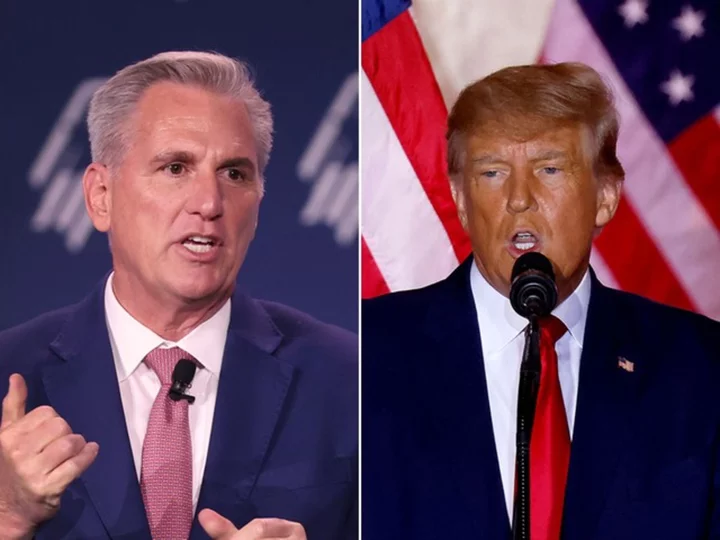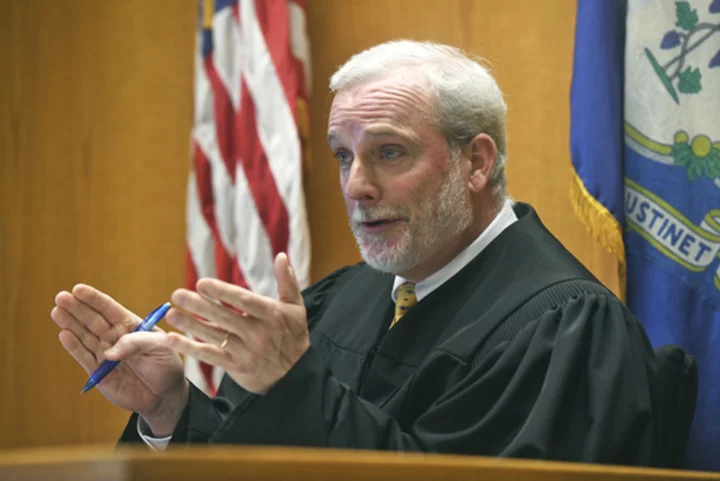When House Republicans elect a new speaker this week, the only question is not whether, but how far, they will move the party to the right.
House Majority Leader Steve Scalise and House Judiciary Chairman Jim Jordan, the two announced candidates, represent different strains of modern conservatism, with Jordan more unreservedly identifying as an acolyte and collaborator of former President Donald Trump, including in his efforts to overturn the 2020 election. But both Scalise and Jordan present much more conservative alternatives to Kevin McCarthy, the ousted speaker who always appeared more focused on his personal ascent than any ideological mission.
It's nearly certain that the GOP House leadership over the next few days will tilt further to the right, absent a Scalise-Jordan stalemate that causes a less ideological alternative to emerge -- or a comeback from McCarthy, who refused to rule himself out in interviews Monday. A victory for either Scalise or Jordan would parallel and reinforce the movement underway in the Republican presidential race.
On that front, Trump has established himself as a dominant front-runner, while embracing an agenda and rhetoric arguably even more vitriolic and divisive than during his presidency, including a recent declaration that undocumented migrants were "poisoning the blood of our country" and a suggestion that the outgoing chair of the Joint Chiefs of Staff should be executed.
The speakership succession in the House and Trump restoration in the presidential race are both pushing the GOP in the same direction -- toward a 2024 message and strategy focused overwhelmingly on the priorities and grievances of its base voters.
The combination of another Trump nomination and a House GOP leadership more firmly rooted in the right could help the party generate enormous turnout next year from its most ardent supporters. But analysts in both parties agree such an alignment would test the GOP's ability to maintain support through Election Day from independent and swing voters who are now expressing the most receptivity to the party in years, amid their widespread disenchantment with President Joe Biden's performance.
The GOP's national leaders "don't seem interested in taking advantage of the situation that they are being presented" among less partisan swing voters, said Paul Bentz, an Arizona-based Republican pollster.
Former Republican Rep. Carlos Curbelo likewise believes that the Republican lurch to the right is threatening the party's capacity to hold the large pool of swing voters discontented with Biden. "But for Donald Trump and the culture of dysfunction and chaos that he's promoted inside the House Republican conference, Republicans would likely have a major advantage going into 2024 and a strong possibility of winning a trifecta again" through control of the White House, the House and the Senate, Curbelo said. "But because of Donald Trump and his acolytes in the House, the party is engaged in this race to the bottom with Democrats."
It remains to be seen how far the GOP will reposition itself to the right in the speakership and presidential decisions confronting the party. But the choices represent more a difference of degree than of kind.
A victory in the speakership race for Jordan, who has defended Trump and attacked Biden and other Democrats with equal ferocity, would most clearly brand the House GOP as a Trump subsidiary. That's especially true because the January 6 committee viewed Jordan as one of Trump's most important congressional allies in his effort to overturn the 2020 election.
"Jim Jordan was involved, was part of the conspiracy in which Donald Trump was engaged as he attempted to overturn the election," Republican former Rep. Liz Cheney, the committee's vice chair, said last week.
But even Scalise, the alternative considered more palatable to moderate Republicans, is a staunch conservative who once described himself as "David Duke without the baggage," referring to the former Ku Klux Klan leader turned Republican political candidate.
The dynamic in the presidential race is similar. Though it has attracted little attention, Trump has put forward an agenda of bristling militancy, including a massive door-to-door deportation campaign against undocumented migrants, deploying the National Guard into blue cities to fight crime, and eliminating civil service protections for vast swathes of the federal workforce.
But the rest of the GOP field has also advanced hardline conservative ideas that likely would have been considered politically untenable even a few years ago -- such as imposing a national ban on abortion, shooting undocumented migrants crossing the southern border, and using US military forces to attack drug cartels inside Mexico, even without permission from the Mexican government.
On both the congressional and presidential fronts, all of this points toward the GOP doubling down on the political strategy that has defined the party in the Trump era, while producing very uneven results.
After Trump's unexpected victory in 2016, the elections of 2018, 2020 and 2022 all generated disappointing outcomes for the GOP. In each of those campaigns, Trump inspired robust turnout among his core supporters, particularly White voters without a college degree; in 2020, he also improved on the GOP's recent performance among non-White voters without a college degree, though Republicans notably did not advance further with those voters in 2022, despite the group's unhappiness over the economy.
But Trump's electoral strengths were offset by two powerful counterforces. Resistance to Trump and candidates in his mold inspired enormous turnout from Democratic constituencies, with young people (many of them Black, Latino or Asian American) voting at elevated levels particularly while he was in the White House during the 2018 and 2020 elections. Trump's imprint on the party also alienated large numbers of centrist and swing voters, particularly women and those of both genders with at least a four-year college degree.
Democratic House candidates in 2018 and Biden in 2020 each carried independent voters by double-digit margins while dominating among female and college-educated independents. In 2022, Democrats carried independents by only 2 percentage points in House races, but even that was a remarkable showing: The party holding the White House had not won independents in a congressional midterm election since at least 1982, according to the exit polls.
As I've written, Democrats last year performed even better among independents in most races in the key swing states likely to decide the 2024 presidential contest. Running against opponents closely identified with Trump, Democratic candidates won independents by double-digit margins in the Senate races in Arizona, Georgia and Pennsylvania and the gubernatorial races in Michigan and Pennsylvania; Democrats also carried independents by solid margins of 6 to 7 percentage points in the Arizona and Wisconsin gubernatorial races, helping them to win narrow victories in both states.
Since the midterm election, polls have consistently shown that discontent with Biden has created an opening for Republicans to improve on that performance in 2024, perhaps substantially. Biden's rating among independent voters has consistently lagged, with only about one-third of them approving of his job performance in an NPR/PBS NewsHour/Marist poll released last week.
A national Marquette University Law School poll released last week recorded especially bleak ratings for Biden among independents, both for his performance and personal characteristics, according to unpublished results provided to CNN by Charles Franklin, the poll's director. In that survey, independents preferred Trump over Biden by about 6-to-1 for handling the economy, about 4-to-1 on inflation, 8-to-1 on managing the border, and over 2-to-1 for dealing with foreign affairs. Over two-thirds of independents said they considered Biden too old to serve as president (compared with about two-fifths for Trump), and almost twice as many of them said they believed Trump had a strong record of accomplishment as president than said the same about Biden.
Against the backdrop of those withering reviews for the incumbent, many national surveys have found the pattern of the past three elections reversing, with Trump now leading Biden among independents and Republicans running competitively among them in measures of voters' preferences for control of Congress.
The question is whether Republicans can maintain that support through a long campaign -- particularly if they contest 2024 with a lineup of Trump as presidential nominee and a House leadership even more openly deferential to the party's right flank than McCarthy was. Despite Trump's strength among independent and swing voters in the early matchups with Biden, the former president remains deeply unpopular with those voters too. In that latest Marist Poll, nearly three-fifths of independents said they viewed Trump unfavorably and two-thirds of them said they did not want him to serve again as president if he's convicted of a crime.
Dan Sena, the former executive director of the Democratic Congressional Campaign Committee, believes the GOP's further shift toward the right creates two opportunities for Democrats to recapture the House. For Sena, the most important question is what Trump's possible renomination and the turmoil in the House will mean for the 18 Republican House members holding seats Biden carried in 2020, particularly the 11 of them in the deep-blue states of California and New York.
"Does the chaos continue to damage those Republicans in a way that the path to the House is much clearer for Democrats?" Sena asked.
Less visibly, Sena said, these developments inside the GOP will likely make it more difficult for Republicans to offset any losses by capturing seats that Democrats now hold in competitive suburban districts. "It creates a challenge for the Republicans to be able to push into the map," Sena argued. GOP strategists trying to hold the House, he added, "are asking, 'How can I expand the map?' This creates the environment where the opposite is likely to be the case -- where there are more Republicans who are likely to be in a defensive position."
Watching these developments from Arizona, Bentz, the Republican pollster, sees the GOP further committing to the same strategy that has significantly eroded its position there under Trump. Once reliably Republican, Arizona since 2018 has elected two Democratic senators and a Democratic governor, and saw Biden narrowly win the state in 2020 -- largely because he became the first Democratic presidential nominee since Harry Truman in 1948 to carry growing Maricopa County, centered on Phoenix and its mostly prosperous suburbs.
Rather than trying to recapture the previously Republican-leaning suburban voters in Maricopa, Bentz said, the GOP at both the state and national level once again appears determined to replicate "the strategy that Trump and others have used to try to mobilize their own base, but that has not grown the Republican base or addressed independent voters."
Despite the palpable discontent over Biden, he said, focusing primarily on energizing the conservative base could again leave the Republicans short in the state. "In the past, that had been (enough), but as certain portions of the state have changed, they have not kept up," Bentz said.
All of these considerations carry a distant historical echo. The only previous vote on a motion to vacate the speakership came in 1910, when an alliance of Democrats and progressive Republicans instigated an uprising against the rigidly conservative Republican Speaker Joe Cannon. That alliance ultimately split on the question of ousting Cannon, allowing him to survive, but only after it succeeded in changing the House rules to significantly reduce his power. Even though Cannon maintained the gavel, "The majority party was divided, its parliamentary machine smashed," wrote Matthew Josephson, the great historian of gilded age U.S. politics, in his 1940 book, "The President Makers."
The rebellion against Cannon foreshadowed the fractures in the GOP between progressives and conservatives that contributed to the party's loss of the House in the 1910 election. A similar divide doomed the GOP in the 1912 presidential race when progressive former President Theodore Roosevelt launched a primary challenge, and ultimately an independent general election campaign, against his deeply conservative Republican successor in the White House, William Howard Taft. The splits in the GOP coalition allowed Democrat Woodrow Wilson to win easily that year, with Taft carrying just two states.
Such a fundamental fissure in the GOP coalition is unimaginable now. Though between one-fifth to one-fourth of self-identified Republican voters often express negative views of Trump, virtually all of them are indicating in polls that they would vote for him against Biden.
"The key to that is the idea that they view the Democrats as a totally unacceptable alternative," said Emory University political scientist Alan Abramowitz. "They view Biden and even the most moderate Democrats as crazy radicals, a bunch of left-wing lunatics who would destroy the country. It's this phenomenon of negative partisanship that again is at work here."
A similar dynamic has unfolded in the House. The Republicans from more competitive districts may have grumbled, but they largely acquiesced as McCarthy made repeated concessions to his critics on the right -- for instance by launching an impeachment inquiry into Biden without any hard evidence of wrongdoing. And the swing-seat Republicans have failed to promote a more centrist candidate in the speakership race, instead mostly rallying to Scalise as a less objectionable alternative to the combustible Jordan.
"Centrist, governing Republicans should have their own candidate for speaker," said Curbelo, a moderate who lost his competitive Miami-area swing seat in the 2018 backlash against Trump. "That's how they will maximize leverage and put forward a different face for the Republican Party."
Any recoil among centrist voters to a Republican Party moving further right in 2024 will likely occur only at the margins. And yet in a nation as closely divided as the US is now, even small shifts could have a huge impact on the outcome. From every direction, polls are signaling that Biden is facing much more resistance among swing voters than Democrats have confronted in any election since 2016. But it's uncertain whether a Republican Party positioning itself to maximize turnout from its hard-core base can exploit that vulnerability.
Curbelo is dubious that it can. "We don't have to speculate," he said. "The base maximization strategy maxed out in 2016 when Trump won the presidency by a hair. And then this base maximization strategy has been tested three subsequent times, in '18, '20 and '22. The results speak for themselves: a blue wave in American suburbs in 2018, a rejection of Trump in swing states and swing districts in 2020, and a remarkable underperformance by a Republican Party that perhaps had the most favorable economic tailwinds in a century ... in 2022."
Given Biden's problems, that past might not predict next year's results. But by careening further right at both the presidential and congressional level even after the reversals of the past three elections, Republicans are testing the old adage that the definition of insanity is doing the same thing over and over again and hoping for a different result.









